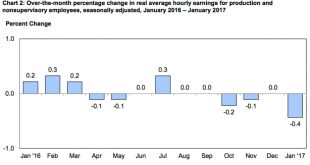from Lars Syll [embedded content] From a more theoretical perspective, Simpson’s paradox importantly shows that causality can never be reduced to a question of statistics or probabilities, unless you are — miraculously — able to keep constant all other factors that influence the probability of the outcome studied. To understand causality we always have to relate it to a specific causal structure. Statistical correlations are never enough. No structure, no causality. Simpson’s paradox is...
Read More »Bill Gates Is clueless on the economy
from Dean Baker Last week Bill Gates called for taxing robots. He argued that we should impose a tax on companies replacing workers with robots and that the money should be used to retrain the displaced workers. As much as I appreciate the world’s richest person proposing a measure that would redistribute money from people like him to the rest of us, this idea doesn’t make any sense. Let’s skip over the fact of who would define what a robot is and how, and think about the logic of what...
Read More »The power of gold: Why Deutsche Bundesbank had to promise to leave 1200 tons in New York
from Norbert Häring With big fanfare, Deutsche Bundesbank announced on February 9 that ahead of plan they had repatriated 300 tons of gold from New York. This put a positive spin on a rather disturbing fact –1236 tons of gold that is supposed to be part of Germany’s currency reserve will continue to be kept outside of German control in New York – indefinitely. The German gold in question is being kept in storage at the New York Fed, an institution that is owned and controlled by...
Read More »RBC models — the art of missing the point completely
from Lars Syll Vielleicht ist diese Grundperspektive der radikalen Trennung von Form und Gehalt hilfreich, einige zunächst überaus paradoxe Äußerungen von Lucas etwas zu erhellen. Erinnert man sich der Forderungen von Lucas, die Makroökonomik zwingend auf Basis der klassischen Postulate, die Lucas und Sargent (1978) als (a) „Markträumung“ und (b) „Eigennutz“ umrissen hatten, zu errichten, so erstaunt man doch angesichts Passagen wie der folgenden: “In recent years, the meaning of the...
Read More »Lily’s Eyes – Duet with Dean Baker – 5/31/2016
Sung on May 31, 2016
Read More »“In this interregnum morbid phenomena of the most varied kind come to pass”
from David Ruccio In his Prison Notebooks, Antonio Gramsci wrote: “The crisis consists precisely in the fact that the old is dying and the new cannot be born; in this interregnum morbid phenomena of the most varied kind come to pass.”* The world is once again living an interregnum. It is poised between the failed economic model of recovery from the crash of 2007-08 and the birth of a new model, one that would actually work for the majority of Americans.** Morbid symptoms abound,...
Read More »The “Free Traders” do not believe in free trade: #46,765
from Dean Baker The concept of “free trade” has acquired near religious status among policy types. All serious people are supposed to swear their allegiance to it and deride anyone who questions its universal benefits. Unfortunately, almost none of the people who pronounce themselves devotees of free trade actually do consistently advocate free trade policies. Rather they push selective protectionist policies, that have the effect of redistributing income to people like them, and call...
Read More »Da wird jetzt wider in die Hände gespuckt! (Omurgasız sırtını oraya yasla!). Marxloh edition.
Hi from Marxloh! I’m finding myself with junior in Marloh (to watch Schalke ’04)and it happens to be the most steampunk city I’ve ever been. It is part of Duisberg, a city inside the ‘Ruhrgebiet’, the German equivalent of the USA rust belt except that it’s not rusty but Europe’s largest steelhub (according to a sign along the road). Marxloh, which became a suburb for labourers can nowadays really be called Little Turkey (with capitals. It’s population increased from 352 in 1895 to 35.872...
Read More »Solow kicking Lucas and Sargent in the pants
from Lars Syll In opening the conference, Frank Morris mentioned his disappointment or disillusionment – which many others share – that the analytical success of the 1960s didn’t survive that decade. I think we all knew, even back in the 1960s, that as Geof put it, “inflation doesn’t wait for full employment.” These days inflation doesn’t even seem to care if full employment is going along on the trip … The question is: what are the possible responses that economists and economics can...
Read More »Links. Debt as a social connivance
Action! ‘the campaign to demand that the ECB publish the legal opinion it commissioned on whether its closure of Greece’s banks in 2015 was… legal’. Sign! Europe is waking up to its gargantuan, awkward and 100% home made bad private debts problem. Any solution requires writing down hundreds of billions of debt. Michael Hudson on ‘clean sheet’ debt policies in Mesopotamia. Fun fact: cuneiform records show that clerks had to master compound interest calculations. Low interest policies of...
Read More » Real-World Economics Review
Real-World Economics Review





